What are the Brexit backstop options?published at 11:02 BST 16 October 2019
What are the plans to avoid a hard border between Northern Ireland and the Republic of Ireland after Brexit?
Read MoreAt 9.30am: MPs question transport ministers
Then: Urgent question on student loan debt
Followed by: Urgent question on death penalty for foreign fighters
Then: Forthcoming parliamentary business announced
Statement on government review of railways
Later: Debate on support for victims of crime
Lords debate impact of Brexit on Good Friday Agreement and the arts
Sophie Morris, Robbie Hawkins and Richard Morris
What are the plans to avoid a hard border between Northern Ireland and the Republic of Ireland after Brexit?
Read MoreBrexit and the arts debate
 House of Lords
House of Lords
Parliament
Responding for the government, Viscount Younger of Leckie says the government has "a few pressing concerns, but do appreciate the value of the arts and their importance to the UK."
"We acknowledge the uncertainty, but can I say that the negotiations are progressing. We are confident of an agreement this autumn", he adds.
The arts "show the world the very best of the UK and strengthen our global relationships," he says.
He acknowledges that "we need to be careful about making a link between salary and skill set. That is something the government is very aware of."
He adds that the government aims to negotiate an ambitious "cooperative accord on education and culture" with the EU.
Responding to multiple calls for another referendum from peers, he says "this government will never accept a second referendum."
Lord Bragg then concludes what he says was "a beautifully one-sided debate."
Brexit and the arts debate
 House of Lords
House of Lords
Parliament
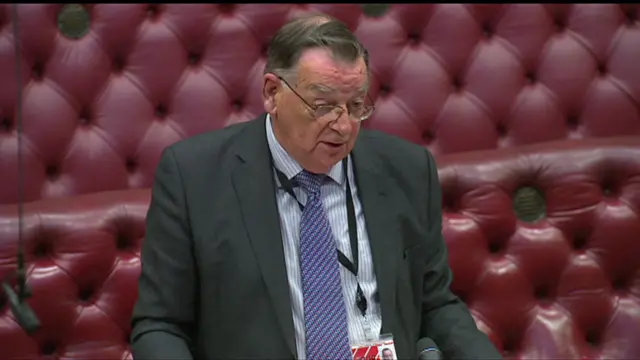 Image source, HoL
Image source, HoLFollowing a debate that has seen peer after peer warning of Brexit's negative impact on the arts sector, Labour's Lord Griffiths of Burry Port says the minister is in a "invidious" position.
"Every speech from every corner of the house has struck the same note", he says.
Wrapping up on behalf of the opposition, Lord Griffiths criticises the government's approach to Brexit negotiations: "the government has dithered, fighting pillow fights in the dark with each other...it simply isn't good enough."
The adjournment debate ends, and the day in the Commons draws to close.
The day ended as it began - with MPs discussing train services, as they did during questions to transport ministers in the morning.
More tales of transport woe were delivered during a statement from Transport Secretary Chris Grayling on the terms of reference of the rail review announced last month.
The day's two urgent questions saw clashes over the sale of student debt and how the UK should co-operate judicially with countries that use the death penalty.
The day's main debate was on the government's new strategy to support the victims of crime, which saw a number of opposition MPs question minsters on the funding available to charities.
Brexit and the arts debate
 House of Lords
House of Lords
Parliament
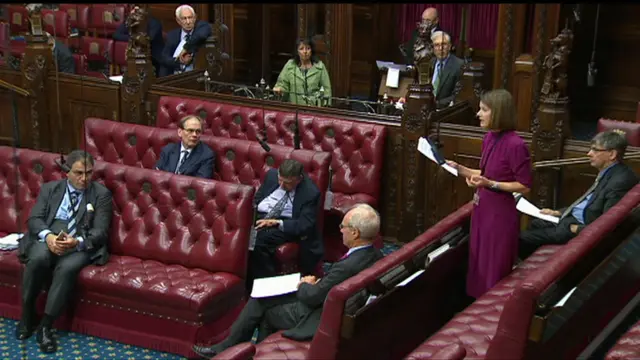 Image source, HoL
Image source, HoLFormer dancer and creative director of the Royal Opera House, crossbencher Baroness Bull, is now contributing to the debate on Brexit's impact on the arts.
The arts sector "makes a major contribution to our nation's success" and "is enriched by international exchange," she says.
"Significant cultural infrastructure has been funded by the EU," she points out, adding that the loss of EU funding will "hit hardest the regions that voted Leave."
Those areas that most voted in favour of Brexit receive double the amount of EU funding received by those that wished to remain, she explains.
"Post-Brexit, we're going to need the arts more than ever before," she concludes.
Adjournment Debate on Liverpool Street Station
 House of Commons
House of Commons
Parliament
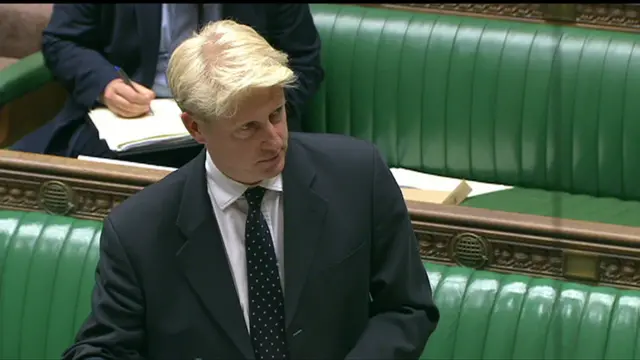 Image source, HoC
Image source, HoCTransport Minister Jo Johnson says the government is working closely with Network Rail to "drive down delays and cancellations".
He says that £46m has been pledged as an investment on the Liverpool Street to Chelmsford line from 2014 to 2020.
He says that although the government caps regulated fares, it's up to rail operators where to set fares below the cap.
He suggests that Greater Anglia could reduce fares as part of compensation for delays.
"The current service of both Network Rail and Greater Anglia must improve, and there have been a number of regrettable circumstances over the summer.
The performance of both will be monitored over the coming weeks," he adds.
Brexit and the arts debate
 House of Lords
House of Lords
Parliament
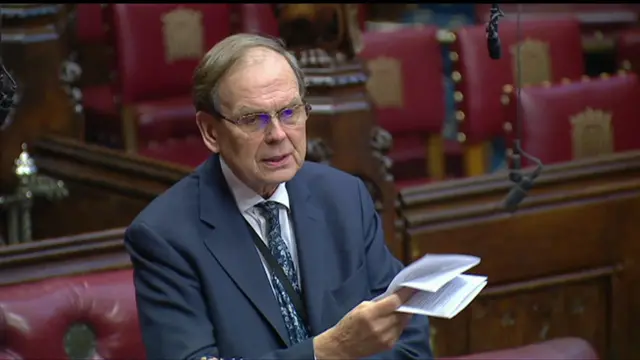 Image source, HOL
Image source, HOLElected hereditary peer, the Earl of Sandwich, says "the evidence is overwhelming that we're going to lose money from Brexit, and especially from the arts".
"Arts and culture are critical to our society and our economy, and their contribution is inestimable. Yet they are viewed by some as somehow additional or expendable."
He says as soon as the referendum result emerged, he emailed European friends "to apologise for the appalling so-called democratic decision."
He asks if the minister can say that more money will flow into the arts after Brexit.
"Of course he can't, but I wish he would," he concludes.
Adjournment Debate on Liverpool Street Station
 House of Commons
House of Commons
Parliament
Moving on to delays following new train timetables in May, he says "not one of the big train company executives had the moral compass to admit plans were behind schedule when asked".
He adds that he has "some sympathy" for Transport Secretary Chris Grayling.
However, he says rail nationalisation is "not the answer", suggesting instead that the "old regional railway companies" should be recreated under a single management.
Train and track should be re-unified and "run as an integrated business", he says.
He says Abellio Greater Anglia needs "a new management and a fresh start", and "must start treating customers like customers and not cattle". He further calls for Network Rail to be broken up.
Adjournment Debate on Liverpool Street Station
 House of Commons
House of Commons
Parliament
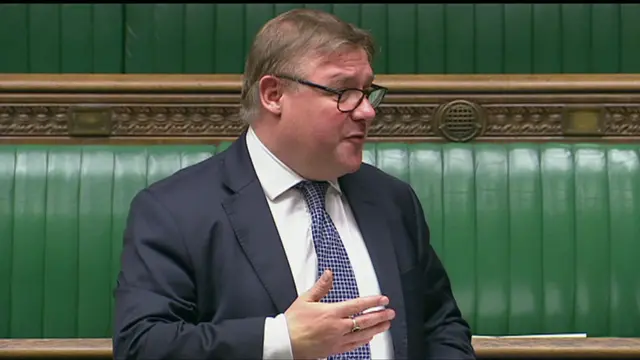 Image source, HoC
Image source, HoCThe debate on support for crime victims comes to an end.
Today's adjournment debate, led by Conservative MP Mark Francois, is on train services into Liverpool Street Station in London.
He says one in ten Greater Anglia trains operating from Liverpool Street arrive at their destinations late, and staff believe the firm is cancelling trains to avoid paying fines for delays.
He says new rolling stock is expected on the station's lines in April 2019, but adds that new trains are "no good to anyone if they are stuck in the depots because of yet more engineering works."
"Season ticket holders who pay £5,000 should get a discount when they renew their annual tickets in January," he says, and he calls on the manager of Abellio Greater Anglia, Jamie Burles, to resign.
He says Greater Anglia's service is "pathetic" and "now operating as a glorified bus service".
Victims Strategy Debate
 House of Commons
House of Commons
Parliament
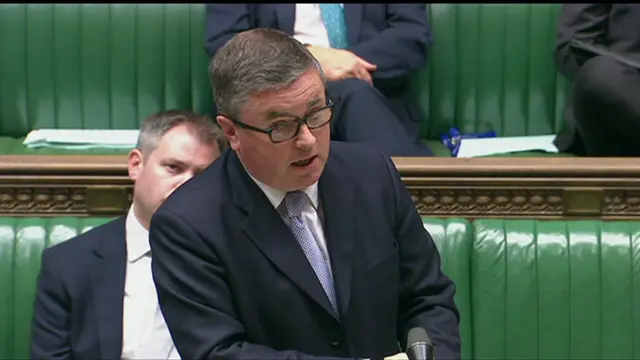 Image source, HoC
Image source, HoCSumming up the debate, Solicitor General Robert Buckland says he has seen how the judicial process can be "overwhelming" for victims.
He says legislation "must be absolutely right", and "time must be taken to do this".
He calls for more training to be given to solicitors and barristers in dealing with sexual assault cases, including cross-examinations of complainants and victims about their sexual history.
He says he supports moves for police officers to wear body cameras when taking victims' statements, as allows them to be stored without asking them to "recount the story again and again".
"The scars for victims may not be physical, but they remain for a long time and it is compulsory that we do more to offer more support to victims throughout this time," he says.
Brexit and the arts debate
 House of Lords
House of Lords
Parliament
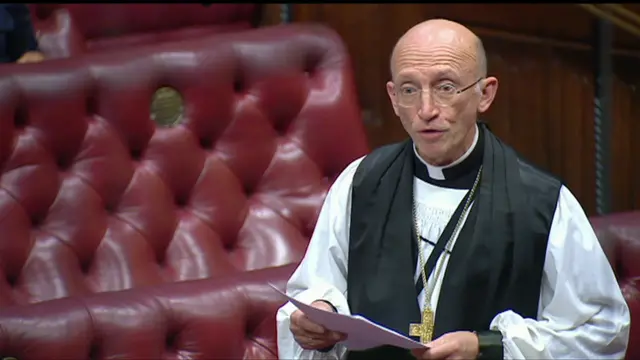 Image source, HoL
Image source, HoLComposer Lord Berkeley of Knighton, who sits as a crossbencher, says if European musicians' access to the UK is restricted after Brexit it will "hugely impoverish our cultural landscape."
Brexit risks making the reputation of the arts as "elitist and London-centric" field "a self-fulfilling prophecy," says the Bishop of Chichester.
"The arts challenge us to be more intuitive and capable of naming a reality that is not a commodity."
Brexit and the arts debate
 House of Lords
House of Lords
Parliament
Conservative peer Baroness Hooper says she "deplores the need to have today's debate," as she is a "reluctant Brexiteer."
But she says "more clarity is needed on these issues". A lack of clarity is "already having a negative effect", she adds.
Labour's Lord Liddle says Theresa May's proposals for Brexit - often referred to as the Chequers plan - completely neglect a "large sector of the economy that is dependent on services."
Lib Dem Baroness Bonham-Carter says art brings an important economic benefit to the UK, but "has a function that is beyond and more important" - stimulating imagination, feeding regeneration and promoting the UK around the world.
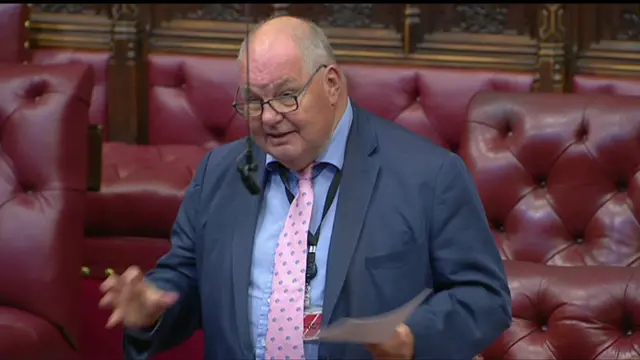 Image source, HoL
Image source, HoLVictims Strategy Debate
 House of Commons
House of Commons
Parliament
Shadow justice minister Yasmin Qureshi the Labour Party welcomes the new strategy but "there are lots of things missing from it".
She says the strategy is "full of ideas, but not a lot of substance", and asks the minister how much funding the scheme will receive and where it will come from.
She echoes the call from Labour MPs earlier in the debate to remove the right to cross-examine complainants about their sexual history during sexual assault trials.
Yasmin Qureshi also says the victims of revenge porn should have anonymity, and this should be enshrined in law.
"More protections for victims must be granted immediately, and this strategy makes a start on that," she says.
Brexit and the arts debate
 House of Lords
House of Lords
Parliament
The Lords are now debating Brexit and its impact on the arts, led by Labour peer Lord Bragg.
He says Brexit "will do great damage" and the referendum result only happened as a result of "a crucially under-informed people".
"Who said referendum result should be a god-given document? We're better than that."
He tells the Lords that the creative sector employs more than two million people in the UK, and compares Brexit to Henry VIII's dissolution of the monasteries in terms of its impact on the arts.
"What sort of legacy is this for our generation to pass on?", he asks.
Victims Strategy Debate
 House of Commons
House of Commons
Parliament
The DUP's Jim Shannon says "many victims do not understand what has happened to them and there is an environment of fear".
He tells MPs that more funding is needed to provide victims with "immediate assistance after they have been involved in a crime".
He calls for tighter sentences for repeating offenders, and criminals who commit serious crimes.
He adds that many victims do not have faith in the criminal justice system, particularly the Parole Board.
Free ports debate
 Westminster Hall
Westminster Hall
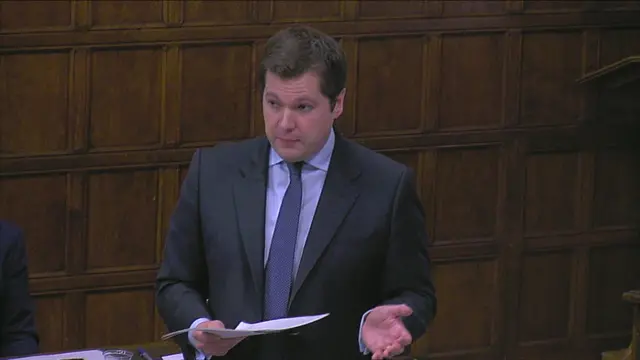 Image source, HoC
Image source, HoCTreasury Minister Robert Jenrick says he supports the goals of many of the points raised today, including increasing inward investment and trade with the rest of the world.
He says that the five 'free zones' were not reinstated across the UK in 2012 as the government didn't see the need for the scheme to continue.
He adds there were very few negative complaints when the scheme closed, and companies have continued to operate over the UK's customs regime without any problems.
The government wants to see "more Canary Wharf style opportunities" to allow local areas to be redeveloped, he adds.
He finishes by saying this is an area that he is "personally very engaged in," but, he adds, questions need to be answered on how "criminality and illicit trade" will be negated.
Victims Strategy Debate
 House of Commons
House of Commons
Parliament
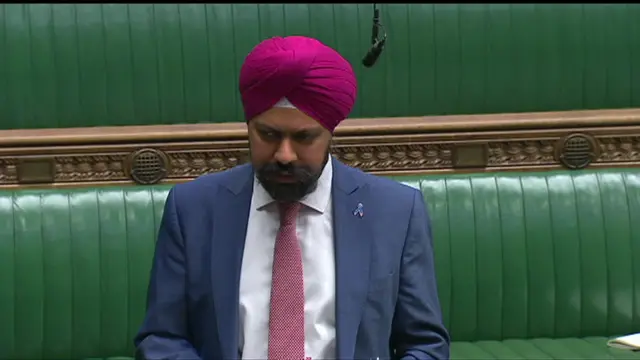 Image source, HoC
Image source, HoCLabour MP Tanmanjeet Singh Dhesi says the current victims compensation system is "creaking, cumbersome and slow".
"The victim suffers twice, once at the hands of the criminal, and once at the hands of the criminal justice system," he says.
He says a victims law is needed, "enshrining the rights of victims for all to see".
"If the criminal justice system were a school, it would now be in special measures", he adds.
Free ports debate
 Westminster Hall
Westminster Hall
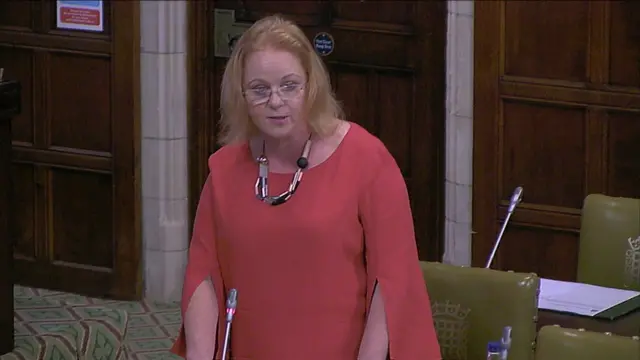 Image source, HoC
Image source, HoCShadow international trade minister, Judith Cummins, says that the UK's port industry is the second largest in the EU, leading to thousands of jobs in the sector and large tax revenues.
She raises concerns that HMRC has said that it will not be ready for the additional border checks required after Brexit by March 2019.
She warns that the World Bank has said free ports are often "white elephants" which lead to a lack of tax revenue.
The Economist magazine has reported that free ports can actually damage tax returns, she adds.
She tells MPs that free trade zones have previously been used to transport arms without proper checks.
The UK must become "a bargain basement tax haven off the coast of Europe," she adds.
Free ports debate
 Westminster Hall
Westminster Hall
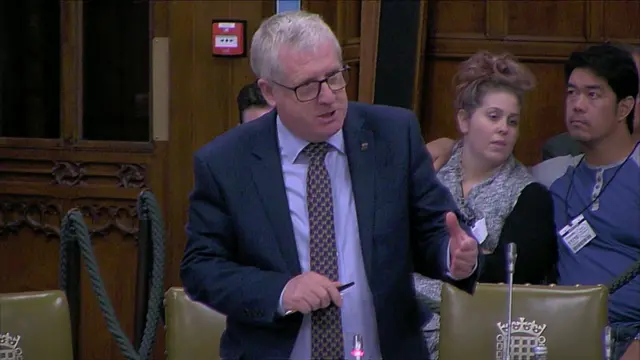 Image source, HoC
Image source, HoCThe SNP's Douglas Chapman says that in the "absence of a customs union" the UK is having to "reinvent" the free zone.
He points out that areas in Spain have significant free ports and free trade areas.
These free trade zones would be best placed outside of London and the South East if they are best to tackle economic inequality, he states.
Victims Strategy Debate
 House of Commons
House of Commons
Parliament
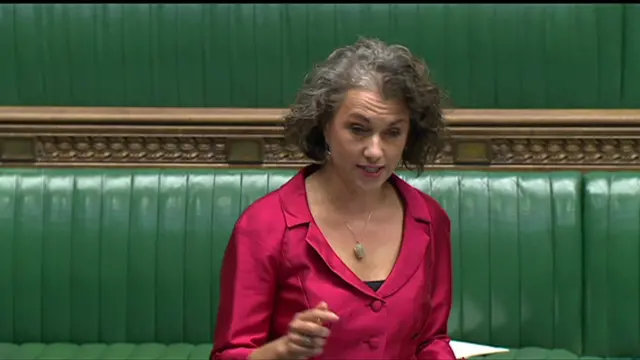 Image source, HoC
Image source, HoCLabour MP Sarah Champion says the minister's commitment to victims is "admirable", but adds "we must now see real changes rather than just talking about it."
"What's actually needed is more cash in the system," she says, adding that small charities need more funding to be "functional in the long term".
According to Public Health England, she says, 80% of 13-17 year old girls had at least one mental health disorder after five months, and 55% had at least two.
"Currently, mental health charities are unable to meet their demand with the funding they are given. This is morally and fiscally irresponsible," she says.
"I urge the minister to implement statutory long term interventions, although the Victims Strategy is an excellent first step."